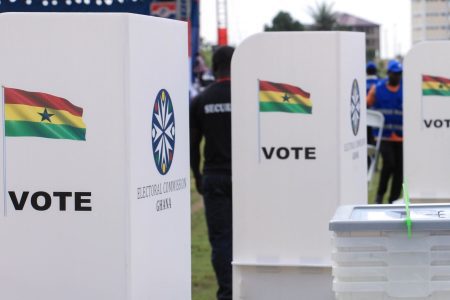Widespread violations of laws governing the District Level Elections (DLE), particularly the intrusion of political parties, have reignited a growing chorus advocating for a reconsideration of the non-partisan nature of District Assembly Elections.
Many of the candidates are Electoral Area Coordinators and Polling Station Executives of the New Patriotic Party (NPP) and the others are National Democratic Congress (NDC) Branch and Ward Executives.
Also, concerns have been raised about the low voter turnout in District Level Elections in decades as compared to General Election.
While the national voter turnout for District Level Elections stood below 40% since 1988, voter turnout for General Election, which involved presidential and parliamentary candidates and partisan, averaged 70% since 1992.
Some experts have proposed the participation of political parties in the District Level Elections to help mobilise resources and whip up public interest.
The National Association of Local Authorities of Ghana (NALAG), the National Commission for Civic Education (NCCE), the Coalition Of Domestic Elections Observers (CODEO), and various civil society organizations, along with political observers, are urging a national conversation on the possibility of making the DLE partisan.
Current regulations strictly forbid political parties from participating in the DLE, with Article 55(3) of the 1992 Constitution explicitly prohibiting party politics in local governance.
However, recent infractions have prompted a reevaluation of the existing system.
A planned referendum in 2019 to amend the Constitution and allow political parties to participate in local-level elections was abandoned due to a lack of consensus among stakeholders.
Supporters of the move argue that making the DLE partisan could enhance citizen interest and participation.
However, concerns have been raised about the potential deepening of political polarization if such a shift were to occur.
Election observers contend that the current non-partisan system is not functioning as intended, leading to a lack of significant benefits from the considerable resources invested in local government elections.
Persistent public apathy towards the DLE is seen as a hindrance to effective grassroots participation and inclusive development.
CeDA research on partisanship
The Center for Decentralization Advocacy (CeDA) said its research, discovered that the colour scheme of the campaign posters depicted the political parties the contestants are affiliated to. Citizens, according to the research, clearly understand this coded communication tool adopted by the candidates and their parties.
It made the claim that about 65% of the candidates are political party functionaries at the electoral area level.
CeDA accuses NPP and NDC of playing critical roles in the DLE claiming that the major political parties actually conduct elections in the various electoral areas to select the candidates for the DLE
The Think Tank claims that Members of Parliament from both political parties provide logistical support to their favorite candidates in the form of cash, posters, street lights, rubbish bins, etc.
NALAG calls for partisanship
NALAG also reiterated its call for the election of Assembly members to be done on partisan lines, suggesting that this could increase voter turnout at the local level.
NALAG President Nana Eric Prempeh emphasized the organization’s position on the politicization of local government elections.
The National Commission for Civic Education (NCCE) also advocates for a review of the District Assembly Elections Act to address low voter turnout.
NCCE advocates “decent partisanship”
The Director of Operations, Mr. Samuel Asare Akuamoah, proposed allowing for “decent partisanship” to boost citizens’ enthusiasm for the elections and improve local governance as a foundation for national development.
CODEO, in its 2015 report on the DLE, also called for a national conversation on the possibility of making the elections partisan.
The original intent of the district assembly elections was to identify community members committed to developing their areas and elect them based on their merit rather than party affiliation.
However, at a point, political parties infiltrated and monitised the system to abuse it and defeat the noble objectives associated with it.
It is an open secret that members of the District Assemblies have been elected on partisan lines and it appears that the nation has no solution to this blatant violation
As the debate over the nature of the DLE continues, proponents argue that formalizing a partisan system could align with the practical reality on the ground, acknowledging the existing partisan influences.
They urge political leaders to have the courage to reform relevant constitutional articles and the Local Government Act without delay to address the apparent destabilization of the Constitution.
District Assembly elections occur every four years, providing an opportunity for citizens to elect representatives to the District Assemblies.
Simultaneously, elections for Unit Committee members, which form the lowest level of Ghana’s local government structure, are held every four years as well.
- Enterprise Life launches improved education investment solution - 31 March 2025
- Access Bank Ghana launches “Fa Ketewa Bɛgye Kɛseɛ” promo - 31 March 2025
- President Mahama Calls for unity at Eid Al-Fitr celebration - 31 March 2025

